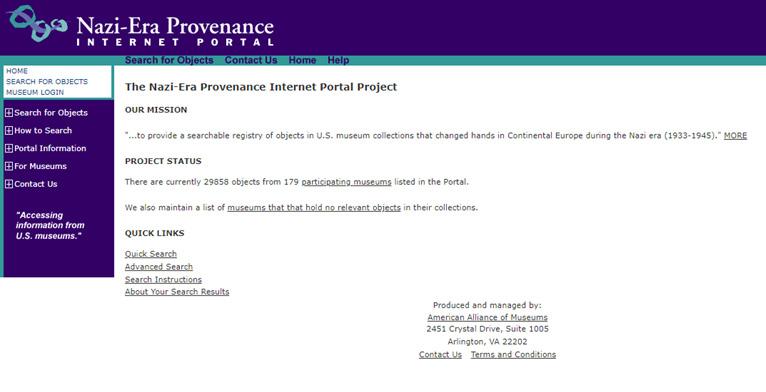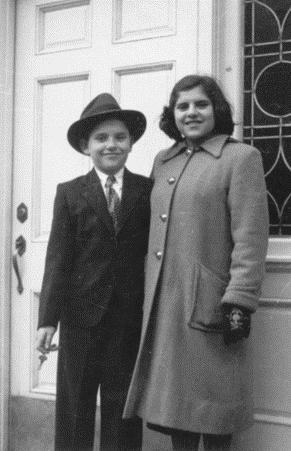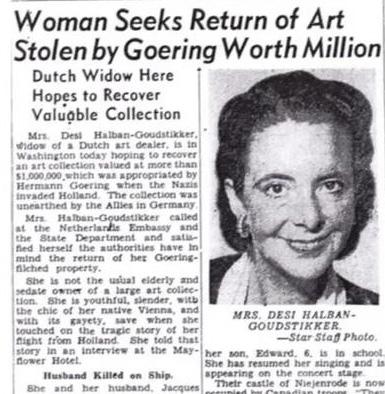
5 minute read
A Young Man Answering the “Call”
This is a story of politics, innocence and awakening in the 1930s and ’40s in Nazi Germany — the innocence of a 19-year-old GI in 1944 and the awakening of a then-20-year-old GI in 1945.
A 1944 sketch of Warren Joseph Chamberlain
The setting starts with my dad, Warren Joseph Chamberlain joining the Massachusetts Army Guard while at Northeastern University in Boston. He was born in Columbus, Ohio on March 25, 1925, the only son of Alfred and Odlile Chamberlain. The Massachusetts Army Guard had been established during the first World War as the 26th infantry division, better known as the Y.D. or Yankee Division. With the war heating up in Europe, the Y.D. was called up and sent to Fort Jackson, South Carolina for training and organization. Dad was assigned to the 101st infantry regiment company H and in August the Y.D. was sent to Camp Shanks in New York to be shipped over to France. In NY they boarded the Saturnia , an Italian luxury liner taken as a prize of war when the United States officially declared war on Italy and Germany. Dad landed in Cherbourg, France on September 7, 1944, where he volunteered for duty with the “Red Ball Express” a unit formed to truck badly needed supplies to the front lines.
After a short stint driving for the “Red Ball,” it was off to combat in Nancy, France. When his company came under German mortar fire, dad was wounded and sent back to a hospital in England. Once recovered from his wounds, he was put back on the front line to fight through France, Belgium, Luxembourg, and Germany. On his 20th birthday, he crossed the Rhine River in pursuit of a rapidly retreating German army. The next month was spent cleaning up the SS and other die-hard troops.
In Schwarzenfeld, German, his company came across the bodies of hundreds of Polish Jews who had been murdered by the Nazis. Under the supervision of the Y.D. leaders, orders were given to respectfully handle the bodies and prepare for burial. All bodies were placed in wooden coffins and given a proper resting place.
From Germany, the 101st infantry regiment moved into Austria. On May 4, 1945, they assisted in the liberation of the Gusen concentration camp. Gusen was a subcamp of Mauthausen camp and contained both Polish and Russian prisoners. It also housed a brothel which was used to reward “special” soldiers. Here is where dad witnessed the real tragedies of this war. Seeing bodies piled up like cordwood and enduring the sight of the walking skeletons, along with the overwhelming stench of death had a profound effect on him, for the rest of his life. After supervising the humane burial of the victims by the locals and the captured guards, the unit was moved into Czechoslovakia.
May 7, 1945 — the war was officially over. After the end of the war all weapons were turned in and most troops were preparing to be shipped stateside. Dad volunteered to serve in Czechoslovakia assisting the Red Cross by transporting supplies back and forth across the Russian line and assisting with the care of displaced persons. He was issued a pass from General Eisenhower and was re-armed. Dad had a memory that lived on with him. He recounted the following: One evening after supper, he was approached by a newly-wed couple and it became clear that they wished to get out from behind what was soon to be the “iron curtain.” Despite the language barrier, my dad understood their desire and agreed to help. Ethnicity, nationality nor religious beliefs were important to him. He just needed to help them. So he went back up the hill to the hotel where he had dinner and acquired a bottle of vodka to be used as a bribe for the Russian guards. After stowing the couple away in the back of the deuce and a half he was driving (a two-and-a-half-ton truck) he drove them to freedom in American occupied Germany. Only the family of this young couple knows of their ultimate fate but they now were free from the postwar turmoil of 1945.
Today, perhaps we need to look back and study the events leading up to this tragic time in the history of the world. The rise to power of the Nazi and fascist governments and the imperialist ideology of the Japanese were primary causes of this genocide. Maybe now we will understand how truly fragile democracy was and continues to be.
My dad, Warren Joseph Chamberlain, was not a hero, just a young man answering the “call”. Dad became an adult during the war and was a caring, understanding and open minded person. Dad came home, and therefore I am. ■ JOHN CHAMBERLAIN


Polish and Russian prisioners were held at Gusen concentration camp in Austria.
M
his family to live in the same house in the Hessian village of Windecken, Germany. The picturesque village of 4,000 souls was 650 years old, complete with a small castle. Jews comprised about 10 percent of the popula tion. The synagogue and cemetery were about 500 years old. Relations between Christians and Jews were excellent into the early 1930s, then gradually deteriorated over that decade. Those Jews who did not leave by 1940 were sent to a camp in France, starved, and later murdered. Manfred’s father, Salli, was a decorated WWI combat veteran. His mother’s family had owned a dry goods and furniture shop LES BERGEN years of apprenticeship, for my father it was in clothing sales in Frankfurt. He sold clothing in a shop in Grossen-Linden, south of Giessen. In 1937, five or six SA ( abteilung John Chamberlain is the business owner of Casual Living and son of a Gusen Concentration Liberator. thugs from the neighboring village waited for him outside. As he left to deliver a coat, they beat him with blackjacks. He thought they would murder him, so he told them to hang him “one-and-half meters high, so you won’t have to bow down to kiss my ass.” He suffered lifelong damage to his ears, headaches, and other issues. The local doc











